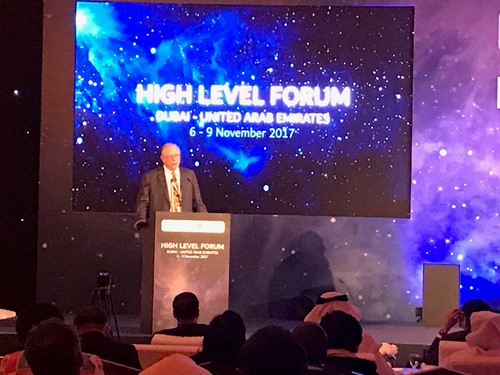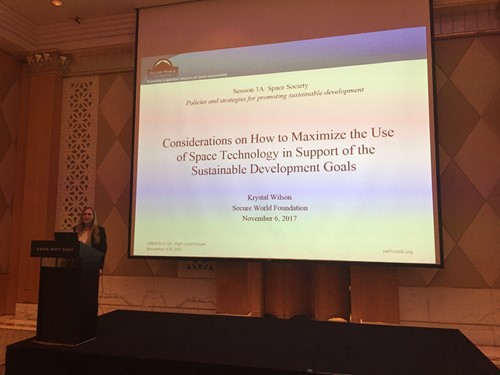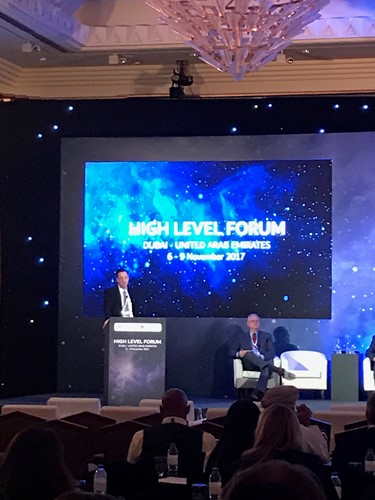SWF Participates at UN/UAE High Level Forum
Wednesday, November 15, 2017
The Secure World Foundation was a sponsoring partner and participant at this year's United Nations/United Arab Emirates High Level Forum – Space as a Driver for Sustainable Development, held Nov. 6-9 in Dubai, United Arab Emirates.
SWF's Executive Director Dr. Michael Simpson, Project Manager Krystal Wilson, and Space Law Advisor Christopher Johnson presented and moderated multiple sessions during the forum, and Dr. Simpson delivered opening remarks and participated in the closing panel.
This year’s High Level Forum was held to focus attention and streamline priorities for the planned UNISPACE+50 Conference in 2018, and align the efforts of the United Nations Office for Outer Space Affairs (UNOOSA) with the UN-wide Sustainable Development Goals (SDGs).

Dr. Michael Simpson's remarks in the High Level Panel: International Cooperation and Challenges towards UNISPACE+50 reminded participants of the pressing importance of the High Level Forum as a gathering tasked with a complex mandate and with great potential. His presentation “Space2030 and the SDGs: Seeking to Broaden Benefits through Synergy” delved into more direct linkages between space and the Sustainable Development Goals (SDGs) and the need to clearly communicate space components and benefits to the non-space audience. In keeping with the UN’s instructions to presenters, Dr. Simpson offered several recommendations for initiatives to be included in the Space2030 action agenda. Among these were that the HLF be converted into a permanent forum to permit broad and effective input to the space policy agenda, and that the UN organize a forum through which exchanges of views on different interpretations of the Outer Space Treaty could occur regularly. Both of these suggestions appeared in the final report.

In the Policies and Strategies for Promoting Sustainable Development session, Krystal Wilson presented linking the SDGs with the space industry and with existing space technologies. Her presentation “Considerations on How to Maximize the Use of Space Technology in Support of the Sustainable Development Goals" touched on specific ideas for utilizing space technology for the SDGs including suggesting that the HLF should continue to broaden participation to a variety of potential partners and to ensure the outputs are targeted to the widest possible audience. She stressed that only by continually raising awareness as well as building the practical tools to facilitate user adoption will space truly be able to be a driver of sustainable development. Ms. Wilson also moderated the Capacity-Building and Information Dissemination session.

Christopher Johnson's presentation on the SWF Handbook for New Actors in Space focused on this project’s goals of documenting best practices in the space industry, and how this activity allows for the integration of new actors into the governance domain of space. Under the Space Accessibility theme, projects such as this book - which aggregate the laws and other norms of sustainable action in space - assist new actors in becoming responsible actors in the space domain. Mr. Johnson’s presentation slides are here.
This year’s High Level Forum was held in anticipation of next summer’s UNISPACE+50 Conference, and efforts towards its success are already underway. Fifty years after the UN's first conference on outer space, the UNISPACE+50 conference will bring the international community together again and set the priorities for the future of space governance and the coordination of space activities.

 Share
Share